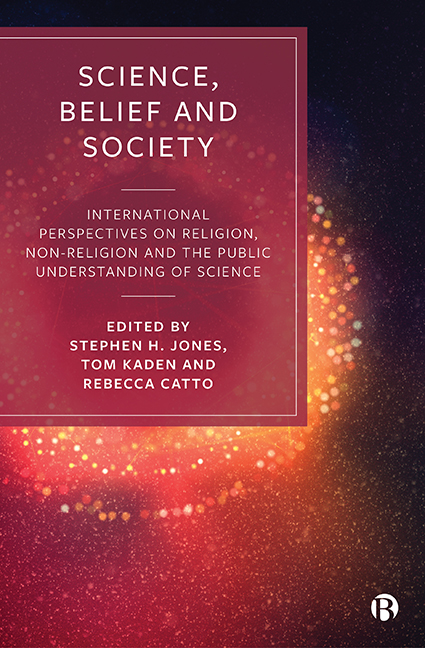 Science, Belief and Society
Science, Belief and Society Book contents
- Frontmatter
- Contents
- List of Figures and Tables
- Notes on Contributors
- Editors’ Acknowledgement
- Foreword
- Editors’ Introduction: Science, Belief and the Sociological Tradition
- PART I Methodological Challenges in the Study of Science and Belief
- PART II Belief in the Study of Science and Technology
- PART III Science, Culture and Non-religion
- PART IV Religion, Conflict and Moderation
- Conclusion: Future Directions in the Sociological Study of Science and Belief
- Index
Editors’ Introduction: Science, Belief and the Sociological Tradition
Published online by Cambridge University Press: 27 April 2022
- Frontmatter
- Contents
- List of Figures and Tables
- Notes on Contributors
- Editors’ Acknowledgement
- Foreword
- Editors’ Introduction: Science, Belief and the Sociological Tradition
- PART I Methodological Challenges in the Study of Science and Belief
- PART II Belief in the Study of Science and Technology
- PART III Science, Culture and Non-religion
- PART IV Religion, Conflict and Moderation
- Conclusion: Future Directions in the Sociological Study of Science and Belief
- Index
Summary
Science, belief and sociology
Summarizing the sociological study of science and religion a little over 10 years ago, John H. Evans and Michael S. Evans (2008: 88) wrote:
Although we know of no study of the comparative coherence of sociological research areas, we suspect that the field of religion and science is one of the muddiest in all of sociology. The conceptual source of this muddiness lies in the long-running academic assumption that religion and science always conflict and that they conflict over competing truth claims about the world. It is therefore hard for sociologists to analyze the relationship dispassionately because sociology itself was born as a scientific alternative to religion.
While, as we will see shortly, there have been notable developments since this was written, Evans and Evans's point still stands. Sociological exploration of questions to do with science and religion (or, as we prefer to phrase it, science and belief) is extremely limited and scattered across largely isolated sub-disciplines. Beyond the US (where most research has focused), it would be hard to even describe it as a ‘field of study’, so limited and disjointed has research been to date. This is surprising in many ways because science and religion has been an abiding subject of public debate for many decades in many parts of the world, and there are numerous ways in which it intersects with sociologists’ concerns. Religious voices play a prominent role in many conflicts over science, from stem cell research to, most famously, evolution. There has also been a trend towards religious groups – from evangelicals (Toumey, 1994) to Muslim revivalists (Unsworth, Chapter 12, this volume), to Hindu nationalists (Thomas, Chapter 6, this volume) – justifying their beliefs by making a claim on science (von Stuckrad, 2014). At the same time, science has been deeply entangled in debates about secularization; many non-religious people see science as central to their identity (Lee, Chapter 8, this volume), while humanist and secularist organizations have regularly characterized themselves as ‘fighting in the name of science’ (Kind, Chapter 9, this volume). Yet, this subject has been on the margins of sociology for many years.
It is hard to understand why this is without, as Evans and Evans say, taking into account the influence of what historians refer to as the ‘conflict thesis’.
- Type
- Chapter
- Information
- Science, Belief and SocietyInternational Perspectives on Religion, Non-Religion and the Public Understanding of Science, pp. xix - xxxviPublisher: Bristol University PressPrint publication year: 2019
